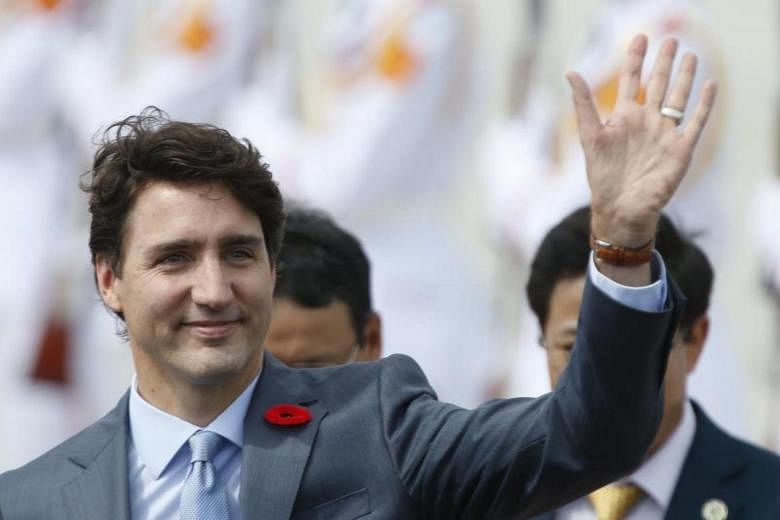DANANG, VIETNAM - There was confusion and drama in Danang on Friday (Nov 10) as a planned meeting of world leaders involved in the Trans-Pacific Partnership (TPP) trade pact failed to take place, after Canadian Prime Minister Justin Trudeau did not turn up at the venue.
They were supposed to have met to discuss the fate of the TPP, amid the many differing points of view over how to proceed with the deal after the abrupt withdrawal of the United States in January.
It is understood that the leaders' meeting has been postponed and could take place on Saturday at the earliest, on the sidelines of the Asia-Pacific Economic Cooperation summit in the Vietnamese coastal city.
The so-called TPP-11 is made up of Australia, Brunei Darussalam, Canada, Chile, Japan, Malaysia, Mexico, New Zealand, Peru, Singapore and Vietnam.
There were vastly contrasting comments from different countries in the messy build-up to the scheduled leaders' meeting on Friday.
Over the past few days in Da Nang, the chief negotiators and trade ministers had numerous meetings to try and iron out an agreement, even an in-principle one, for the leaders to discuss and endorse.
It looked as if there was, in fact, a breakthrough after the marathon talks ended late on Thursday night.
On Friday morning, the Japanese government issued a positive statement saying that Prime Minister Shinzo Abe welcomed a "broad agreement" that was reached by the TPP-11. That, however, was quickly disputed by Canada, which insisted that there was no such agreement.
It was not immediately clear why Canada was so resistent, although Mr Trudeau told a forum in Ho Chi Minh City that Canada would not be arm-twisted to agree to anything until it felt the terms were right for its people.
"We're not going to sign a deal just because we feel pressured into a signing a deal. We are going to make sure that it's right for Canada and it's right for the world," he said. "We're in no rush to do that, so we're going to take our time and look carefully at the negotiations."
The future of the TPP has been in limbo ever since President Donald Trump yanked the world's largest economy out of the deal.
The original TPP would have been the world's largest free trade agreement, covering 40 per cent of the global economy. Now that the US is out of the picture, the 11 nations represent about a third of that, or about 13.5 per cent.
The TPP aims to eliminate tariffs on industrial and farm products, with provisions for protecting everything from labour rights to the environment to intellectual property.
Ever since the US withdrew, Japan - the world's third-largest economy - has been spearheading the effort to revive the deal. Tokyo is eager to show that multilateral trade pacts can be successful without America's support.
At almost the same time as the TPP leaders were scheduled to meet on Friday, Mr Trump gave a major speech at the Apec CEO Summit and reiterated his disinterest in free trade deals between multiple countries. He maintained that Washington would make bilateral pacts its main priority.
He added that the US was ready to make a bilateral deal with any country in the Indo-Pacific region, but only on the basis of "mutual respect and mutual benefit".
Speaking to reporters in Danang, Singapore Business Federation (SBF) chief executive officer Ho Meng Kit expressed disappointment that the TPP talks collapsed at the eleventh hour.
"Up until lunch time (on Friday), I was very hopeful. SBF even had a statement that was ready to be issued (to welcome the news of an agreement). Unfortunately, things didn't happen and I'm not sure why," he said. "What's needed now is for the countries to go back, look at their sums again, and re-engage."
Mr Ho added that this latest setback was not as damaging as when the US withdrew completely from the pact, and he expressed hope that the sticking issues could be overcome at some point.
"My overall sense is that the 11 countries are like-minded and they believe in openness, and they all believe in having a comprehensive and high-quality agreement," he said.

